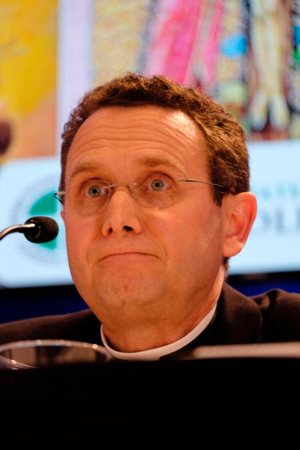
Although unable to vote on specific proposals on episcopal accountability standards and other protocols to address the current clerical sex abuse crisis facing U.S. Catholicism, two bishops suggested items on which a consensus could be built among the nation’s bishops.
“We were reminded of the nagging reality of the McCarrick situation and how that weighs heavily right across the country,” said Bishop Robert P. Deeley of Portland, Maine, chairman of the bishops’ Committee on Canonical Affairs and Church Governance during a Nov. 13 news conference following that day’s session of the bishops’ Nov. 12-14 fall general meeting in Baltimore.
“I thought that was an important takeaway,” he said.
News reports first surfaced in June detailing allegations from decades before against retired Archbishop Theodore E. McCarrick of Washington when he served as a priest and bishop in New York and New Jersey. After further allegations continued to emerge over the summer, Archbishop McCarrick resigned from the College of Cardinals, and has moved to a monastery in Kansas.
“It was interesting to see how the ‘metropolitan in the region’ started to evolve in the discussion,” said Bishop Deeley, who characterized the discussion as “kind of freewheeling.”
Some bishops began advocating on the floor of the meeting Nov. 13 for a greater role for archbishops, who serve as metropolitans for the regions in which they serve. The archbishop of Cincinnati, for example, serves as the metropolitan for all Ohio Latin-rite dioceses. The archbishop of Boston serves as metropolitan for the six states of New England.
Archbishops were being recommended as a possible avenue for being told of allegations against bishops and a starting point for determining the credibility of such allegations; the archbishop also could persuade a bishop to step aside at least temporarily from his diocese as an investigation got underway.
Auxiliary Bishop Andrew H. Cozzens of St. Paul and Minneapolis said he sensed a “firmer resolve” among the bishops around a whole range of issues, signaling a “culture change.”
Those issues, Bishop Cozzens added, include the involvement of the laity in a process of investigating allegations.
“We’ve seen lots of comments and questions about transparency, questions about lists, questions about laity and review boards,” he said. “The principles around how our proposals were built were not questions, just how they are put in practice.”
Bishop Cozzens added, “It was expressed by several bishops today that there was a desire to work with the Holy Father, but to let the Holy Father know what are our needs … and what we’re hearing from our people, the laity, what we’re hearing form the National Advisory Board. Certainly, that’s something the Holy Father’s going to want to listen to.”
He termed it as “one of the clearly felt needs of the body (of bishops) because of the desire we all have to exercise that accountability whatever way we can fraternally.”
Responding to the notion that the bishops cannot police themselves, Bishop Deeley said about such responsibility, “I do not acknowledge turning it over” to civil authorities, because in doing so, “we evade the responsibility ourselves.”
Bishop Deeley recalled how the Portland Diocese dealt with sex abuse allegations against priest when his predecessor, Bishop Joseph J. Gerry, headed the diocese. He “needed the help of the attorney general of Maine,” who in turn collaborated with each of the district attorneys in the state’s 16 counties.
“Consultors went through all the cases. The ones who had accusations or allegations of any kind were studied by the attorney general,” Bishop Deeley said. “It was a cooperative, collaborative process. That’s a fine way to do it, if that’s possible.”



